CogniFit Review: Quickly Level Up Your Mental Performance With Personalized Brain Training

Level Up Your Life With Fun and Games?
You're too busy to play? I can relate.
Burning the midnight oil trying to finish your to-do list from 47 days ago? Story of my life.
Your craving for fun free-time is looming large like JAWS and you're throwing it scraps of time from the chum bucket... whetting its appetite while you rev the productivity engine full-steam ahead.
How do you justify carving out 20 minutes a day three times a week to tackle seemingly extraneous tasks like brain training without burning out and stalling as your best-laid plans become shark bait?
Join me for the cerebral story of why I played CogniFit games to build a buff brain and how it made me more effective in tackling challenging tasks. This blog post contains my review of CogniFit - brain training software.
Here's how my story all began:
Assessment Stress
With CogniFit, you've got a couple of personalized options for measuring and managing your brainpower.
Typically, those around us subjectively assess our performance, pointing out our shortcomings, errors, blind spots, slowness, and forgetfulness.
I can empathize with the embarrassment felt over being mortified as someone points out my shortcomings to all in ear-shot.
Hoping as always that willpower alone will help us do better next time, while worrying history will repeat itself.
Are you stuck in a rut of repeating the same mistakes? Dreading everything that doesn't come naturally? Avoidance of weak areas is our go-to strategy. Our weak areas worsen from neglect.
Trying to learn the hard way has made us more adept at making excuses, apologies, and confining ourselves to a comfort zone that only plays to our strengths.
What other choice do we have in dealing with the way our brain's wired?
Lo and behold, there's an app for that! That app is called "CogniFit"! CogniFit specifically focuses on training your cognitive weak spots!
Our brain's performance isn't set in stone by fate. We can face it, test it, train it, and earn a sense of pride and accomplishment from seeing steady performance gains across the board in our strengths and weaknesses.
I don't know about you, but I've already tried learning the hard way, from a supervisor yelling at me in front of my coworkers. That experience drove home the point that I didn't meet the timeframe expectations of the task but also couldn't empower me to transcend my limitations.
Guess what? It wasn't a one-time occurrence. It was a repeating pattern in my work life.
Require accuracy? I'll nail it.
Must excel at problem-solving? I was born for this.
Desire kindness and patience? I'm all that and a bag of chips.
Speed is what you need? That's my downfall. You know it. I know it. And everybody knows it. Meticulous and conscientious to a fault is my default setting.
I'd always ask the supervisor, "What would you have me do differently in the future to save time with each person I serve?"
Had the supervisor recorded her reply the first time, she could have saved her breath and played it back to me again and again over the years because it never changed, "Christa, you can't take that much time with people. You just can't!"
Supervisors may know what outcome they expect, but they don't know how to help rewire your brain to make progress in that direction.
But wait! There's hope:
CogniFit helps bridge the gap between where you are and where you need to be!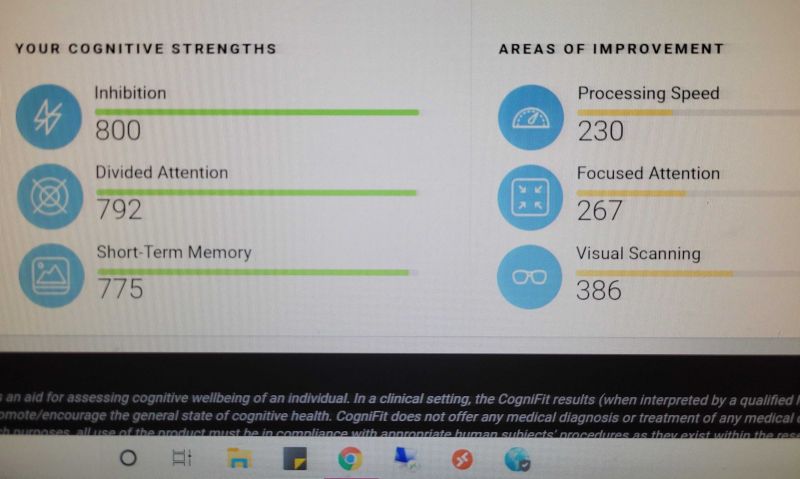
You can see why my supervisors were stressed over the problematic problems created by me over-using my strengths and under-developing my weaknesses.
Inhibition and caution kept me from making mistakes at the expense of processing speed. Doing well with divided attention tasks came easily and focused attention was a struggle. My short-term memory was working, yet my visual scanning was lacking.
Serious Gaming for Success
Brain training games sound almost too easy to be effective. Playing games like Sudoku and chess can help, and they're free. So is that all there is to brain training?
Well, it's a good start. It's just not necessarily a match for strengthening your weak areas. Plus, it's hard to assess whether playing those games would make a difference.
Imagine being an athlete in any competitive sport. Coach says, "See you first thing in the morning for training."
"Nah. I'm good, Coach, because I do my own training in my spare time."
"It doesn't work like that. Everyone on my team follows my training protocol."
"Thanks, but no thanks, Coach. I prefer doing things that come naturally to me to play to my strengths and have fun by myself when it suits me."
"That's not going to work for improving your weaknesses."
"What weaknesses? I mean, yeah, maybe that one time that I could have done better, but that was ages ago, so there isn't really much room for improvement now."
"There had better be! You're accountable to me. If you don't show up for training, you're off the team."
We often go through life wanting to wing it like that arrogant athlete.
My make-shift brain training to date has included studying Spanish and Norwegian, Zumba, science lectures on YouTube, and playing CandyCrush, HomeScapes, and MansionMatters with my husband, Mark.
Theoretically speaking, my neuroplasticity should be more plastic than SillyPutty after my eclectic approach.
Where the rubber meets the road is in my performance reviews. I've never had an employer tell me that my metrics look better after memorizing a song in Spanish or Norwegian.
Why the disconnect? Perhaps my brain is wired to love languages and communicate well enough on the job.
Watching the clock is my downfall. All those newly created neural connections in the language department may not be helping my ability to stay on schedule and meet deadlines.
CogniFit knows this and devises personalized training to help new neural connections set up infrastructure in the ghost-town zone of my brain dedicated to time management.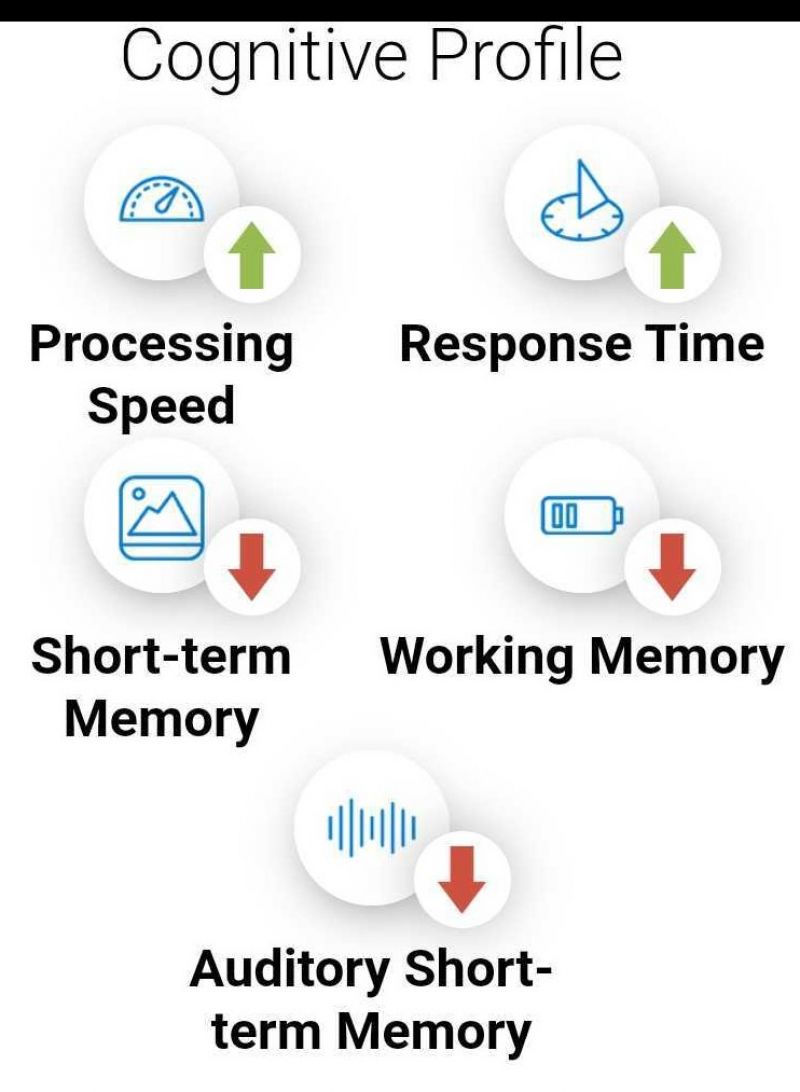
This image is the feedback overview given to me after finishing a daily training session of playing games on the app targeted to help me practice my weak areas to strengthen them.
So are games like Sudoku and chess enough to help me beat the clock on the job? Not necessarily if those games aren't strategically supporting the part of my brain that needs it.
Fair enough, but what about other free games where you race against the clock?
Why Pay for Games? The Price Of CogniFit
CogniFit has perfected the art and science of honing your different brain functions to create a personalized, targeted, incremental system to train and track your performance improvement across a diverse skill set.
They offer a comprehensive, multi-faceted analysis of your brainpower across a far-reaching scope of skills for FREE!
I took that assessment in December 2020 before testing the vagus nerve stimulation device Xen unit by NeuvanaLife since enhanced learning is one of the potential benefits of VNS.
The comprehensive assessment and a follow-up one after the Xen experiment were all I was interested in at the time because I didn't know what I was missing.
When I went to pay for the follow-up testing at the end of the Xen experiment, I received a month of brain training instead. I didn't realize the monthly subscription doesn't include the comprehensive test.
At first, I was disappointed, assuming I was missing out on what I wanted. Little did I know, I was getting so much more than expected!
For starters, the games in the monthly subscription are not as dry and clinical as the ones in the complimentary assessment. They are the same tasks as in the free test, but now they're all souped-up, tricked out, set to fun music, tactile sensations, and celebratory animations when you win.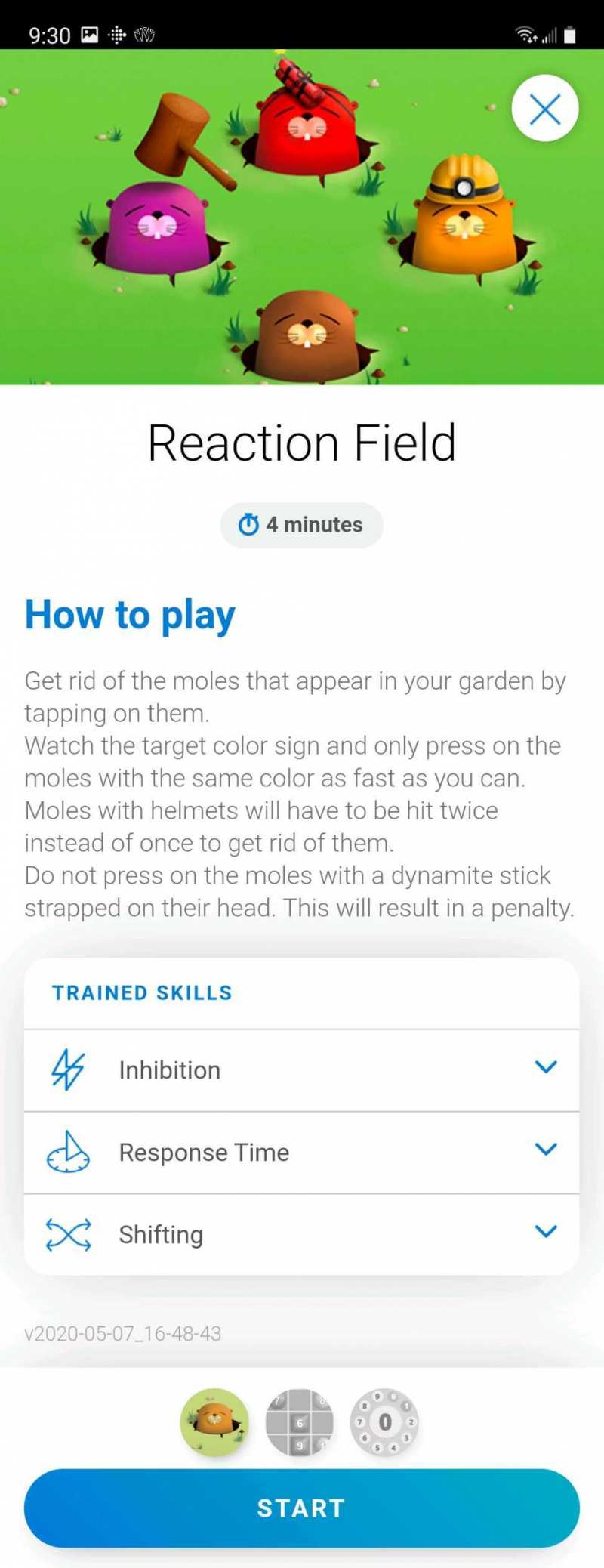
What about the follow-up test I thought I wasn't going to get? CogniFit continuously updated my comprehensive assessment scores after I completed each day's personalized training session.
Every customized session to target improving my weaknesses ended with feedback graphics comparing how I did on those targeted skills today compared to my baseline.
Want to hear a customer service story with a happy ending? Before I understood the value of the monthly subscription, I reached out to CogniFit to explain that I purchased the wrong thing, or so I thought.
CogniFit was quick to reply, clarify my unique need in testing Xen's before and after impact on my brain without any other variables that would influence the results, specifically no brain training like they were offering.
CogniFit came up with a win/win solution that instantly ingratiated them to me. I hadn't even considered experimenting with their brain training until that moment when they went the extra mile in their customer service.
That's when I asked a colleague of mine for the green light to test CogniFit's brain training, and he and Alex granted my request.
The value of what you are investing in with the monthly subscription is well worth it, more than I ever imagined at the outset of the experiment.
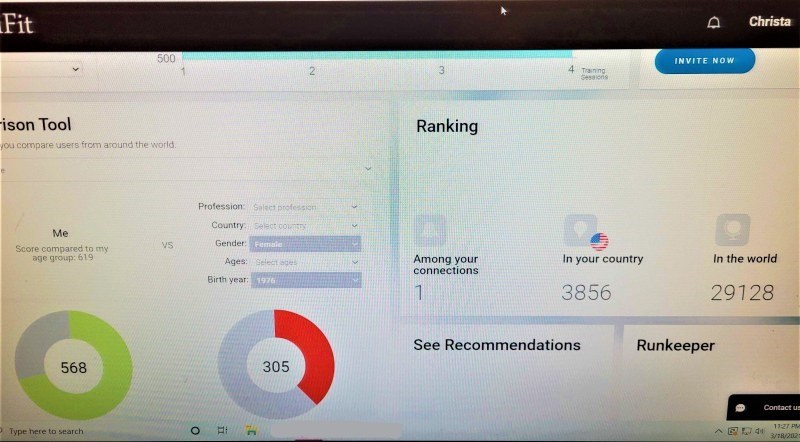
Day two: Thursday the 18th of March 2021 my score was 619 out of 800
which was 101 points higher than my first CogniFit test in December of 2020
Green: average score for those my age. Red: global women my age
CogniFit Fun Factor
Nobody has ever had to twist my arm to get me to play computer or phone games I enjoy. CogniFit games will give you that same dopamine rush.
I had all these preconceived notions of which games I would enjoy most based on my personality, hobbies, and beliefs about my strong suits.
Of course, I gravitated towards those games first when selecting a single game to play for fun. I was surprised that they were much more challenging than expected.
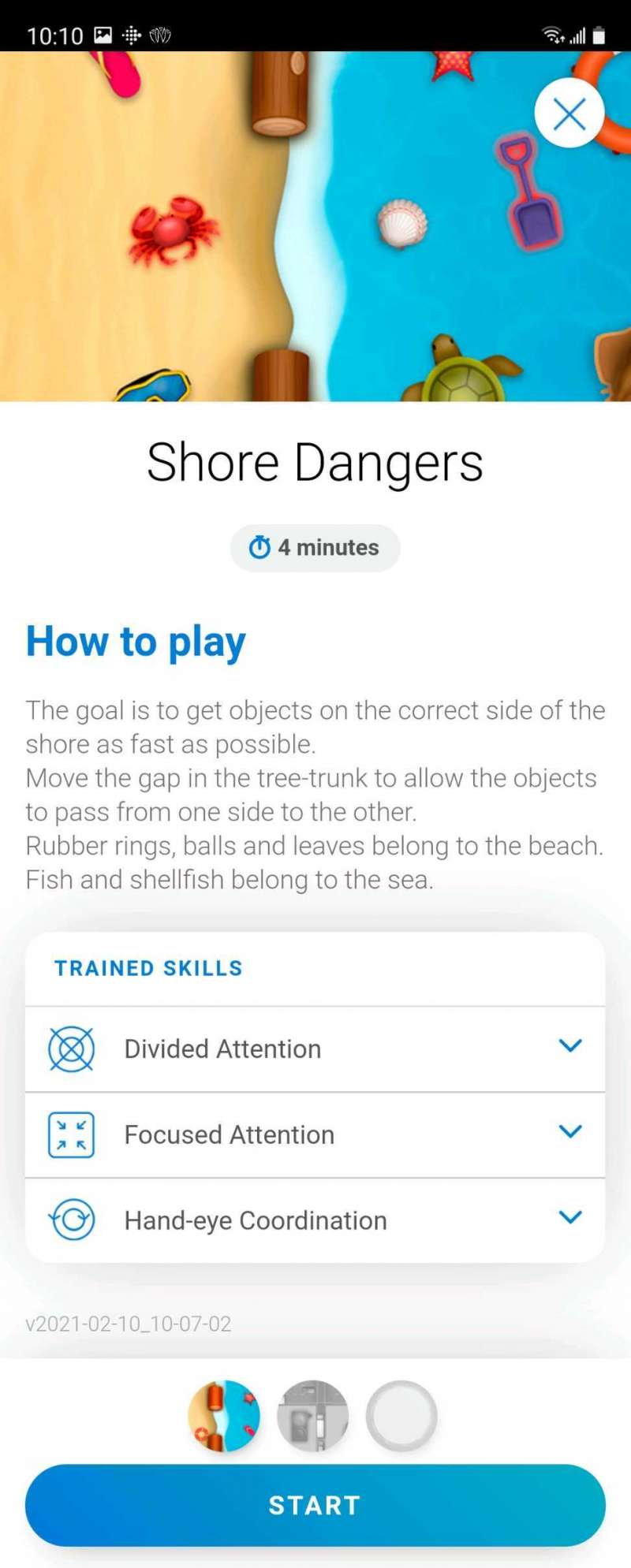
CogniFit Reveals Strengths and Weaknesses
I didn't level up as fast as expected on games geared towards my strengths.
With an insatiable affinity for variety and spurred on by approval-seeking, I ventured into new games in what appeared to be greener pastures.
Some were a perfect fit for the skills I needed to work on, the fun of playing, and the ideal balance of challenge and success.
Other games that looked attractive smacked me upside the head with the sting of defeat. Shaking my head in dismay, sometimes I couldn't even see the rhyme and reason I got the wrong answer even after being shown the right one.
My ego is relieved you didn't see those failed attempts. Alright, I'll tell you if you want. It was the 3D spatial relations geometric blocks game. 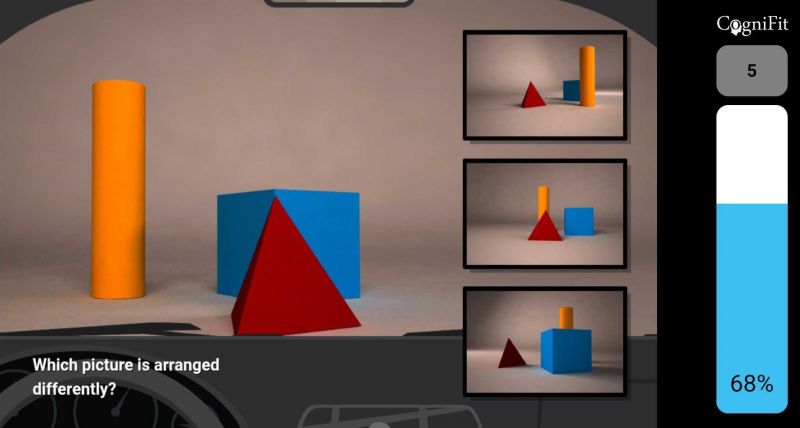
Throwing in the towel was tempting since I couldn't figure out the relationships between those 3D shapes even when shown the correct answer.
At this point, I played my go-to games on repeat. I had ventured as far as seemed necessary from my comfort zone in search of variety and positive reinforcement.
With 40 different games, it took a while to experience those that didn't seem to fit my interests or strengths.
The daily training would sneak one or two of those into each session. It wasn't always an instant attraction. Often by the second or third day playing it, I'd be hooked.
Unbelievably, many of the games with vehicle themes that I had given the cold shoulder ended up being favorites in the end.
Well, maybe not the intersection game of controlling traffic lights to direct traffic since I was cringing the whole time bracing myself for the inevitable crash.
One of my favorites was the pit crew game of attending to the various needs of incoming racecars across multiple lanes. After I found my rhythm for keeping pace, I juggled those fuel cans while grooving to the music and enjoying the good vibes of efficiently helping those impatient racecar drivers. (I'd never make it as a racecar driver, patiently letting all the other drivers pass me out of politeness.)
CogniFit Personalized Training
The training sessions were so fun, I usually did a second 20-minute daily training session back-to-back.
How ironic is that? It's only natural to want to avoid our weaknesses out of shame. On the rare occasion where it's unavoidable, we muddle through, eager for it to be over, and try to forget about our blunders.
In our subconscious monologue, we are chastising ourselves for our lifelong lack of improvement in those awkward areas that always trip us up. The realization stings like a thousand paper cuts covered in lemon juice.
No wonder we avoid practicing our weak areas, but CogniFit is a real game-changer!
You can circumvent this vicious cycle of poor performance, shame, avoidance, lack of practice, and déjà vu... ad nauseam.
CogniFit takes the essence of the skill out of the context of the real world and turns it into an animated, gamified story where your ego is not on the line because you may be stepping into an unrelated character as a bumblebee for instance.
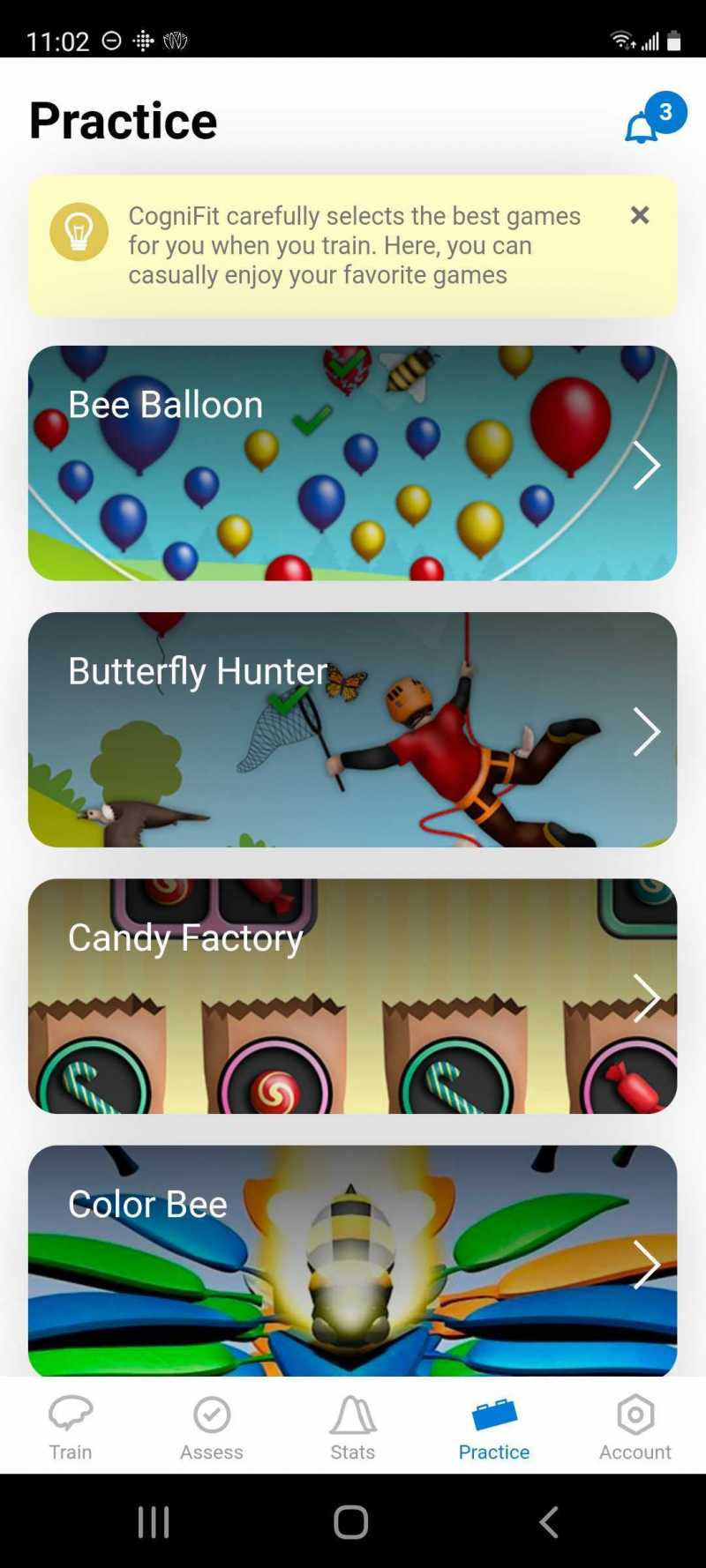
We expect games to be challenging so we can safely take risks and don't take defeat personally. In the heat of the moment, it just feels like fun and games.
Seeing progress and improvement changes your self-imposed label from "I'm no good at that!" to "I keep getting better at that!"
CogniFit Rewarding Achievements
If you're a data-driven-performance-improvement junkie, like me, you're going to derive serious satisfaction from the graphs illustrating your progress.
I would like to see them develop this aspect even more so that I know exactly the standard I have to achieve to reach the next goal. It was a little ambiguous without labels on the different colored brain icons indicating how many points were needed for that ability level.
When I first saw the blue circular gauges, I was quick to assume I wouldn't be able to level up my profile strength because I had 0 of 5 connections. I'm happy to say, that did not hold me back from progressing from white Beginner to green Virtuoso.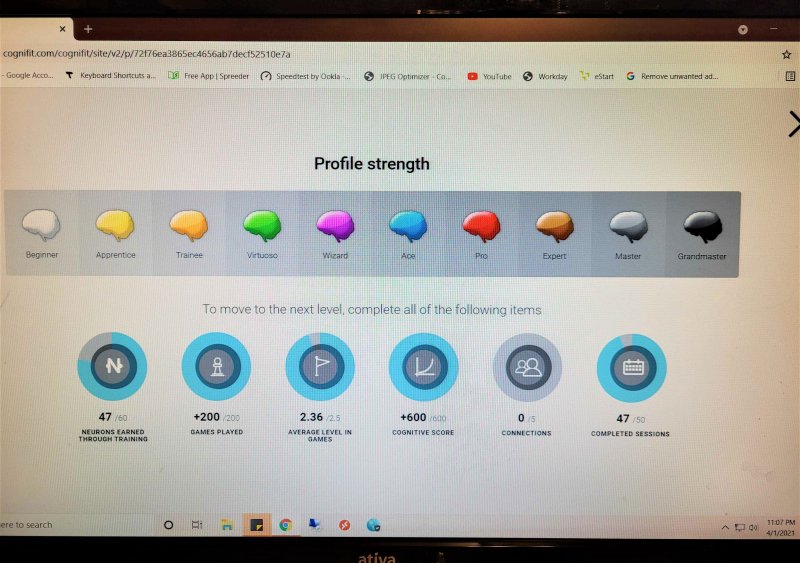
With my overactive imagination, I can't resist sharing that if I were designing this gaming system to be even more motivational to me. I'd incorporate an overarching story scene that I could earn points to add elements to create a continually evolving scene, such as camping.
Earning images to build a scene of friends and family roasting hotdogs, making smores, playing the guitar, a hammock between the trees, fishing from a dock, a kayak or paddleboard, some curious deer, Bigfoot in the woods... you get the idea. Sounds fun and motivating to me.
CogniFit Impact & Improvements In My Life: The Benefits
My vision of what was possible with brain training was far too narrow at the outset. I envisioned a strict one-to-one correlation of a specific skill like helping my working memory get better at memorizing a string of numbers in the game and then using that in my job.
My work performance did level up because improving my ability to recall strings of numbers was a directly transferrable skill.
I thought I had a good working memory because I could remember more than the seven or so digits that I learned was typical back in Psychology 101 class. Sure enough, I was able to remember considerably more numbers than that for long enough to repeat them a few seconds later, and that skill improved further as I played.
I had a blind spot that I was oblivious to until playing these games. If a simple distraction was inserted between the string of numbers being presented and my opportunity to give the numbers in sequence, I would have total amnesia. Often I couldn't even recall the first number.
What an eye-opener to realize my working memory was both strong and weak depending on if there was any distraction involved. I learned to recognize the distraction and jump those hurdles, not as effortlessly as just running unhindered, but also not getting hung up in the first hurdle and falling flat on my face.
Now, when I'm helping a customer and need to recall a long string of numbers while the customer is on a small-talk monologue, I keep feeling proud of myself for the length of digits I can accurately recall. Sometimes, I want to even take a couple of seconds to count how many numbers it was to see if I broke any personal-best records. Instead, I just smile to myself.
Conversely, if I have to recall a long string of numbers, but have to then switch gears to perform a different mental task first before being able to enter the numeric sequence, I recognize the hurdle in my path and use the strategies I developed in the game for dealing with distractions.
If I can then recall the first 5 or 6 digits, I feel proud of myself and at times it is enough to piece together the rest of the digits from context, so I don't have to ask the customers to repeat themselves.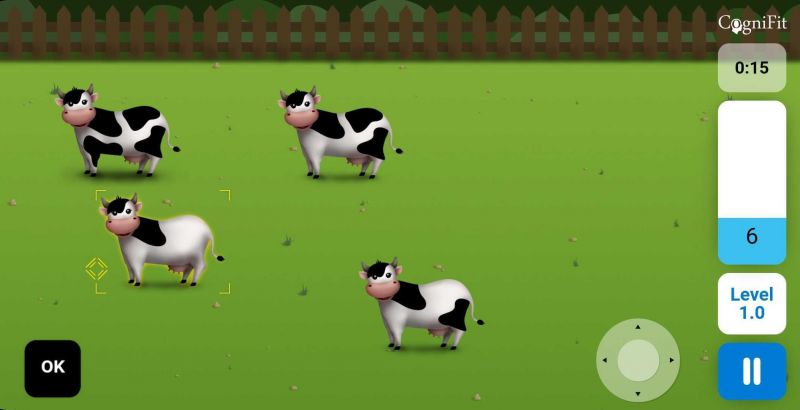
Other direct correlations include this cow game above. The objective is to use the mouse to click on the cows in order from least to most spots. Easy right?
Except that the mouse is hijacked and reprogrammed to swap left and right or substitute up for down and vise versa, sometimes it's topsy-turvy and they scramble all those directions at once.
This skill came in so handy when my mouse died, and I bought a vertical mouse and changed up the sensitivity settings at the same time. When trying to serve customers with an unwieldy mouse, it was so reminiscent of this funny cow game that I wasn't stressed. I just found the humor in it, knowing it was only temporary and that my brain would quickly adapt.
CogniFit Unexpected Benefits
Had you asked me to list my mental shortcomings, "visual scanning" was not even on my radar. Unbeknownst to me, it was a gaping blind spot in my life.
I had always dismissed it as unimportant. Sour grapes. Who needs visual scanning skills? Not me. I had flexibility, patience, and stoicism.
Lost my keys again? That's okay. I'm flexible. I can be patient and wait to borrow my husband's keys and wait patiently for months until they finally turned up on multiple occasions because I'm stoic like that.
CogniFit encouraged me to work on my visual scanning skills by playing games like this one of finding matching tiles. I played this game more than any other since it was relaxing.
Can't fall back asleep in the middle of the night? I'd sit in the massage chair playing this peaceful game that got me out of my analytical over-thinking mode and into a playful, child-like state until I felt sleepy again.
Guess what happened? I lost my keys... again. That first week, I was just being my usual flexible, patient, stoic self.
Out of the blue, I had this realization that I had a real-life opportunity to practice my visual scanning skills in hunting for my keys.
Pushing through the internal resistance and discouraging self-dialogue that it was pointless to even waste time trying, I silenced my ego's sour-grapes coping mechanism by telling myself it was just like playing a game.
Within about 15 minutes of searching as if my home were the backdrop for a visual scanning game, I found my lost keys! How 'bout them apples?
CogniFit Game-World Ambience
Each game has a unique soundtrack designed to enhance the experience. At first, I didn't realize the app also has music. So I took this shot including the volume control below to capture my happiness over this discovery.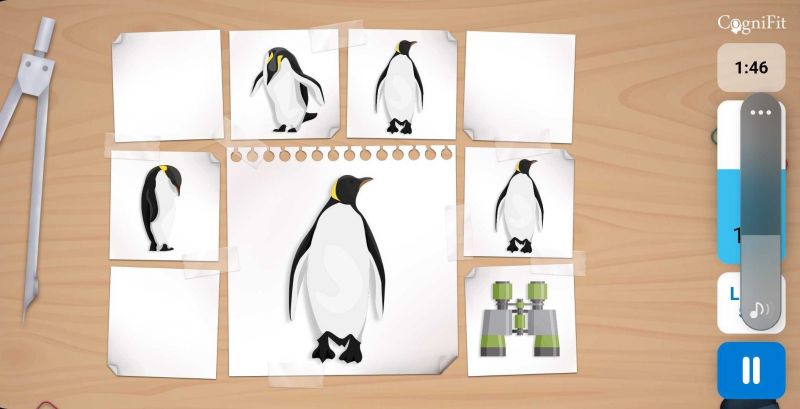
Just as there are a wide variety of games, the music diversity is terrific too. Some are very Zen and others make me want to groove to the beat.
Overall, their games are colorful and attractive. A few, such as the cannonball math train, are in dark tones, but they all have a playful, relaxing vibe.
Also, there is a satisfying sensory soundscape to match the actions in some games, akin to the simple pleasure of popping bubble wrap.
User-Friendly and Works Flawlessly
A handful of the games needed more detailed instructions, but the majority were very intuitive. The app and website are easy to navigate. The graphs showed what I wanted to know at a glance.
There were no technical difficulties. Kudos to CogniFit!
Everything loaded quickly and without any glitches. I would have preferred not having to log in with a password each time on my PC and phone app.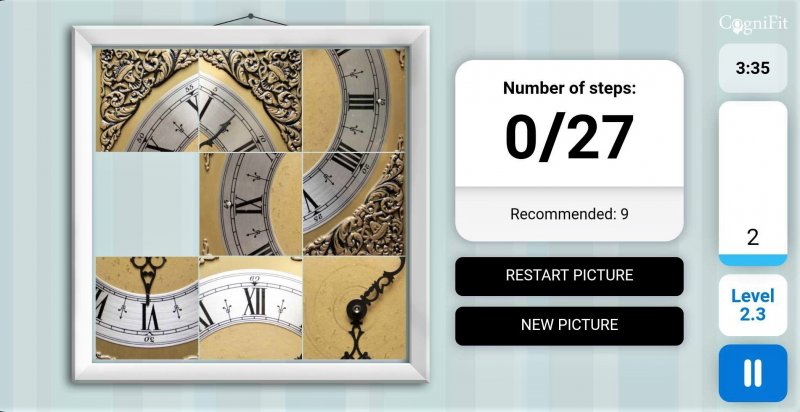
One minor issue was that the app stats didn't show personalized training sessions I had done on my PC.
Overall, both the website and app were incredibly convenient, reliable, and easy to understand.
CogniFit Frustrations
CogniFit is making every effort to customize the difficulty level for each individual, which allows for the steady progress that is so addictive. They hit the mark on most of the games.
I can only imagine how challenging it must be to assess the range of performance for each skill for their users around the globe. With a data-driven system, I'm sure they have a firm grasp of the bell-curve distribution to focus their efforts on meeting the needs of their users.
I'm that student who would debate the semantics of a test question with a teacher privately after class.
I still haven't fully come to grips with question #157 on an American Board of Opticianry certification exam I passed with flying colors nearly a decade and three jobs ago because it's the principle of the thing.
Some of the games made me feel like I was outside the bell curve for better or worse.
It's hard to complain about games where I was doing too well, but I think I can manage... haha.
On a couple of the word games, it would end even though I hadn't made a mistake. I wanted the opportunity to level up. Maybe that was the highest level. Who knows?
It's easier to gripe about games where I didn't stand a chance because that's such a frustrating feeling.
For example, I couldn't make any headway in the mandala coloring game. The objective is to look at a mandala for 30 seconds or so then try to color in a black-and-white outline to match the original from memory with a palate of half a dozen or so different shades of the hue.
This was one of the games I was most looking forward to, but I was no match for the difficulty of level 3.4. I would have appreciated it if they had had more mandalas that were less challenging than this last sticky wicket below. 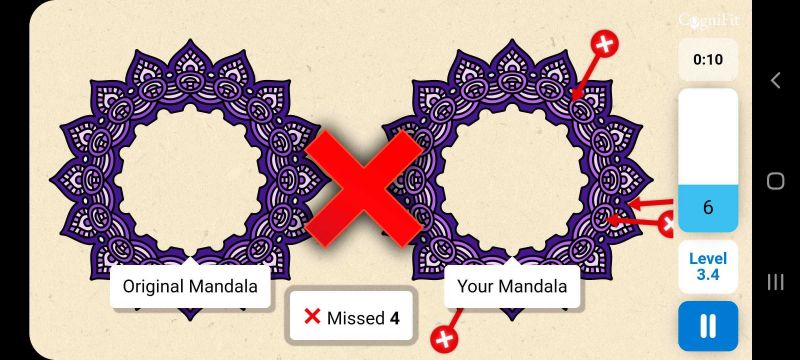
I can see where I went wrong when I'm looking at the two images side-by-side, but trying to select the correct shades from memory was neigh to impossible!
Years ago, I was a self-taught portrait artist who started by doing a portrait drawing gift for Mark's friend's birthday, incorporating his image into a character in a D&D-style scene with a tamed dragon behind him. As others saw my artwork, they would commission me to do portraits for them.
The mandala game is testing visual memory. Not being able to look at the reference image the way I always could while drawing was a struggle to remember precisely what it looked like.
I would have appreciated more elementary levels before the subtle shades of purple mandala brick wall that halted any further coloring opportunities. As much as my ego would have liked to progress beyond that infuriating level 3.4, the lesson learned is that my visual memory could improve with practice.
Besides, CogniFit doesn't have to cater to my every wish for me to benefit from it tremendously! If I had the mandala game popping up red Xs all over my charcoal drawing, pointing out my undetected shading and proportion errors, it would have hastened the completion of that project and made me a better artist.
So often in life, it is just our ego keeping us from doing things like drawing, dancing, calculus, learning to speak a foreign language, learning computer coding, learning to cook, you name it. We think the embarrassment of others pointing out our errors will be the death of us. Au contraire!
Let's let CogniFit desensitize us to receiving red marks along the path to growth so that we can overcome our fragile egos, get outside our comfort zones, progress towards our goals, fearlessly try new things, level up in life, and feel proud of ourselves for overcoming our internal objections to do something we never dreamed possible.
CogniFit Strategic Selection of Skills
Thinking of going it alone and winging it? I can relate!
I'm an eternal optimist with a can-do attitude. A prime example is that my husband had to put his foot down on my desire to bake and decorate our wedding cake. I was already doing the flower arrangements, decorating the reception dinner party room including making gilded ribbon roses for the cake table, making the cake topper...
I thought I could juggle baking and frosting the cake too to fit my ideal vision because the cake decorator didn't think she could pull off the design I saw in a wedding magazine all because I believed I could.
I didn't stress about my wedding, but as an easy-going idealist, it was hard for me to trust that my wise groom knew I was biting off more than I could chew. When I baked and decorated a fancy birthday cake for Mark's 18th birthday the year before, it took me all day. We would have had to postpone the wedding for 16 hours while I carefully crafted the cake of my dreams instead of keeping the main thing the main thing.
Not only that, I'm not remotely time-oriented. Burning desserts repeatedly is the primary reason I'm not a pastry chef. Once, our darling daughter was baking cookies for a contest, and her friend came to the door. I promised to watch the cookies in the oven and encouraged her to go talk to her friend. I accidentally let her cookies burn and will never live it down.
Yet I could imagine myself baking a multi-tiered wedding cake that was an art-gallery worthy sculpture of decadent deliciousness because I've never burnt an imaginary cake before.
Here's the rub: We are not the most accurate assessors of our abilities. Just sayin'.
CogniFit has it down to a science. Check out the image below showing all their different areas of cognitive research. Let them help you understand your cognitive abilities more clearly.
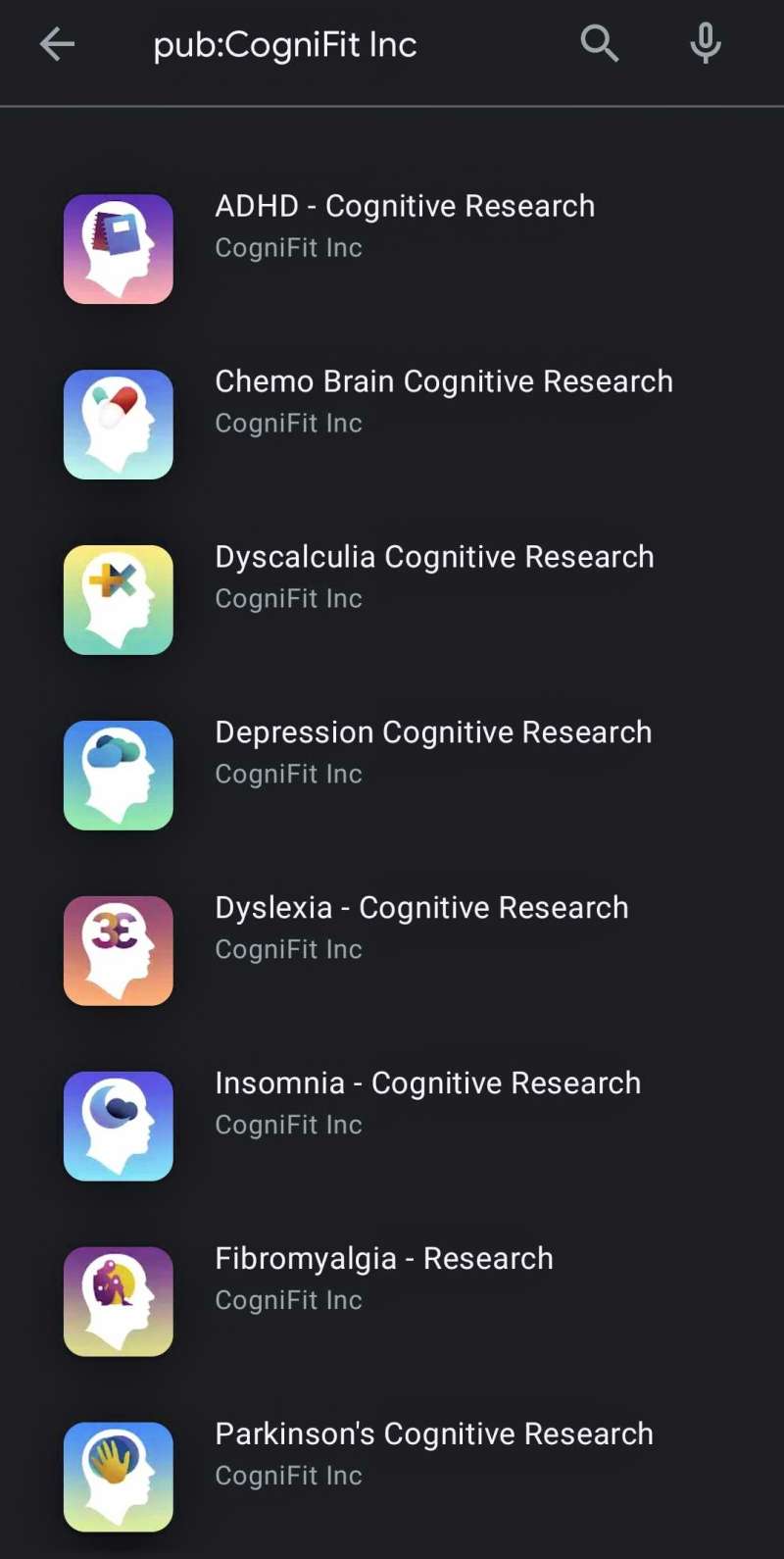
The first cognitive assessment is free. What have you got to lose? They can give you objective feedback that you can use to navigate life like a rear-view and side mirrors to see what you are most likely overlooking.
CogniFit & Scientific Studies Validating The Effectiveness Of The Games
The scientific support for brain training games is worth examining. I didn't research this aspect until after I had subjectively evaluated the program so that I wouldn't be unduly influenced by their findings.
This PubMed article below is cautiously optimistic:
"...the current meta-analytic investigation examined evidence from 43 studies (encompassing 2,636 participants) to evaluate the efficacy of commercial training programs within two separate populations: healthy older adults and older adults with mild cognitive-impairment (MCI). Seven programs were identified: BrainGymmer, BrainHQ, CogMed, CogniFit, Dakim, Lumosity, and MyBrainTrainer. Analyses yielded small, significant near-transfer effects for both healthy and MCI samples."
"Thus, whilst "brain training" may be suitable for enjoyment and entertainment purposes, there is currently insufficient empirical evidence to support that such training can improve memory, general cognition, or everyday functioning."
There's an impressive Who's Who of highly respected institutions that make use of CogniFit's helpful cognitive evaluations and skill-development tools.
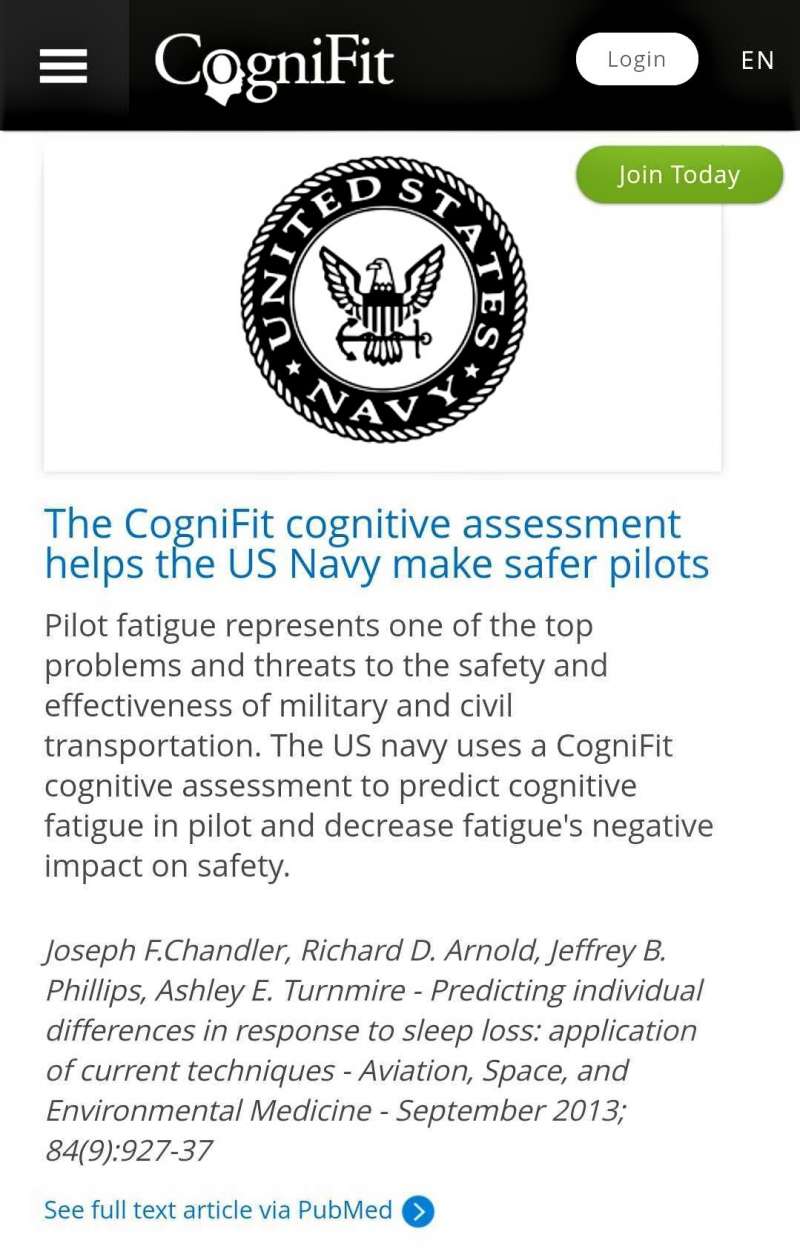
This one caught my eye since I have a long-standing interest in better understanding sleep loss.
Value: Time & Money Investment
Before starting the CogniFit subscription, my bias was that it would be easy to invest the time and harder to justify the cost.
During those weeks of enjoying the games and seeing my scores increase, I kept recognizing that I was receiving more value than expected.
Before subscribing, I was comparing it to the free games I played. After joining, it was evident that there is no comparison.
Time is relative, but here's my take on that side of the equation. Gaming is addictively entertaining.
I could justify spending time on it for writing this article. The plan was to train 20 minutes a day. Once logged in, I was an object in motion that remains in motion.
It cut into my sleep time. Even if I managed to turn off the screen right at my bedtime and dive into bed in the nick of time, I was way to revved up to fall asleep.
The excessive gaming I excused for writing this article came at the expense of not using that time to write up my other experiments. I'm a play before work type of person, so CogniFit took precedence.
When I woke up in the middle of the night and couldn't fall back asleep, I followed the cognitive behavioral therapy advice to get up after half an hour and do another activity until sleepy again.
I'd pull up the CogniFit app on my phone and sit in the living room glider rocker with a heated massage seat and back cushion and play the matching tiles game to work on one of my weakest skills.
It was relaxing and enjoyable. Time flies when having fun, so I often played longer than intended.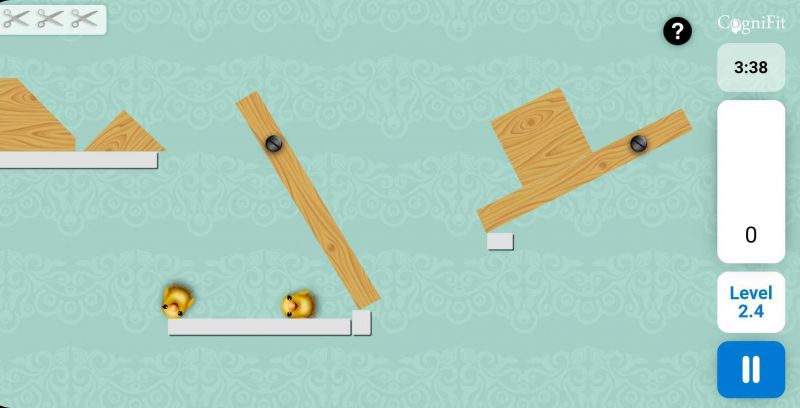
Knowing my tendency to be gung-ho about gaming, when my first month's subscription ended, I told myself I could join again as soon as I met the looming deadline for another article I was writing.
It was a motivating incentive the first week of missing it because it was an enjoyable habit at the forefront of my mind. Next, I told myself that I better finish this next responsibility too before I subscribe again.
After a couple of weeks, the craving to play CogniFit games subsided as I focused on other responsibilities. As I contemplated when to reintroduce it, I kept postponing it because I had other irons in the fire.
It is very much like a gym membership. I loved our gym and used to go twice a day most days before the pandemic. I was going right up until the final day before it was required to close for two weeks in the spring of 2020.
I'm still paying for that gym membership because I have the best memories of going there and have every intention of going back soon.
Ideally, I would pace myself and play CogniFit 20 minutes a day and go to the gym regularly without overdoing it. That's my goal.
How CogniFit Helps Make Life Better For My Loved Ones
Before talking about benefits, here are a few considerations of mine:
- Who has been disappointed when I forgot an event or didn't notice a need?
- Who had to wait while I had a bee in my bonnet and couldn't put down what I was doing to give them my undivided attention?
- Who has picked up the pieces of my impulsive decisions?
- Who has had to pick up the slack when I failed to meet a deadline?
- Who has been bummed out by me crying in my soup after being confronted by yet another coworker for failing to meet their expectations?
- Who has had to set the clocks ahead to help me be on time to events so they wouldn't have to walk in late?
The people I care about most in this world. That's who.
An investment in empowering your brain to function optimally is a gift to your loved ones. Even your future self will thank you later for having a proactive and effective strategy.
Next up, here's the outcome of my testing and the progress I've experienced:
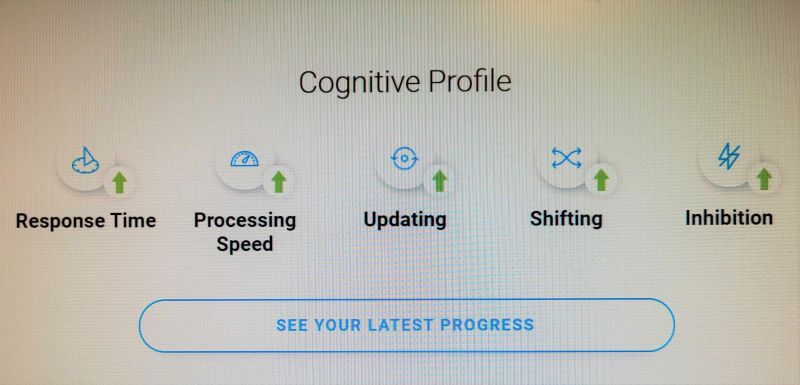
CogniFit My Before & After Results
Day one: Wednesday the 17th of March 2021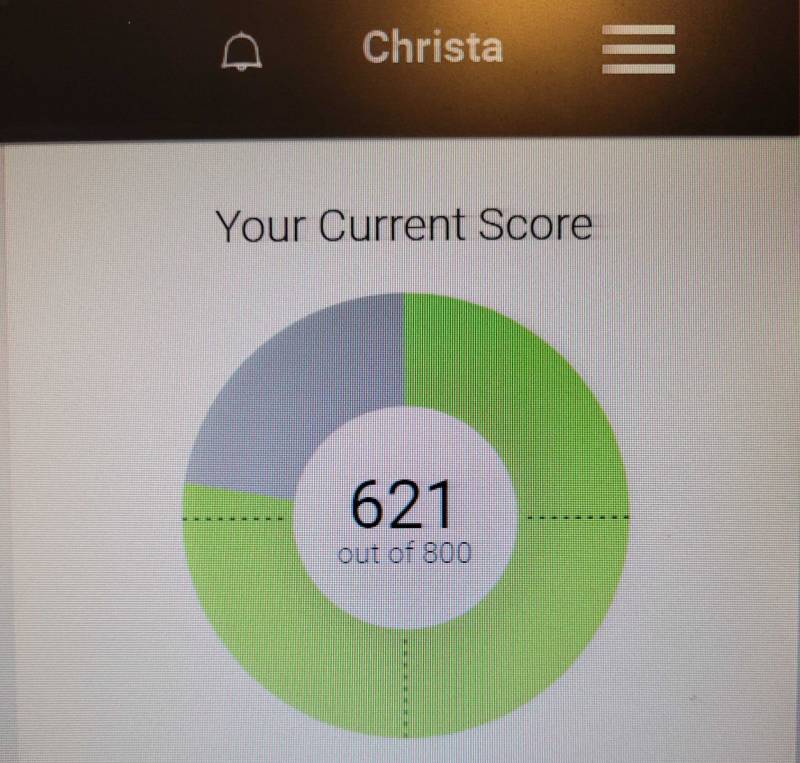
Day one: Wednesday the 17th of March 2021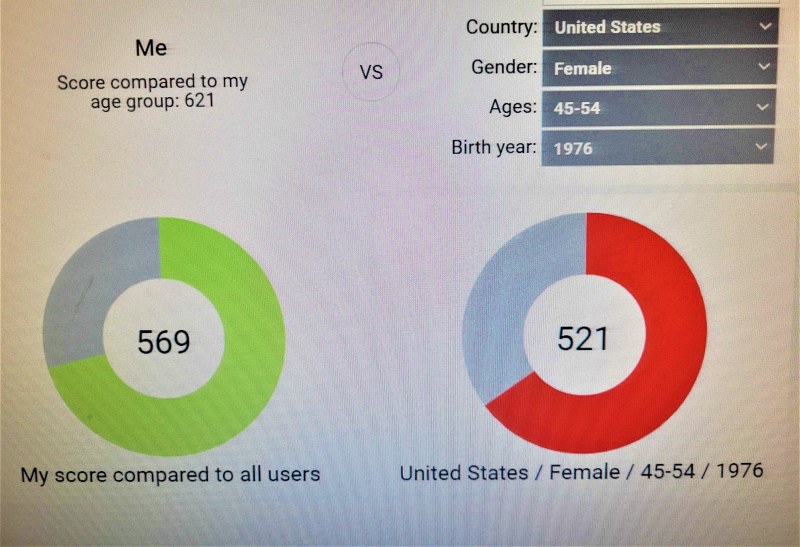
Day one: Wednesday the 17th of March 2021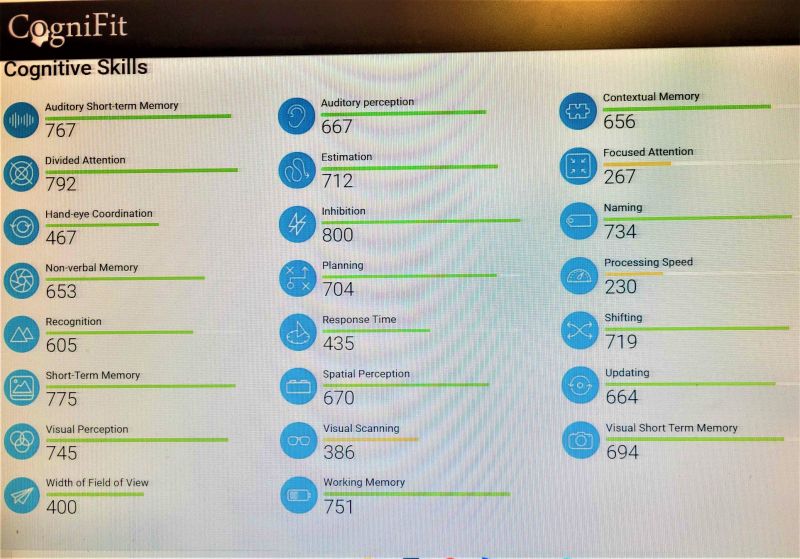
Day one: Wednesday the 17th of March 2021
After 3 weeks of practice: Wednesday the 7th of April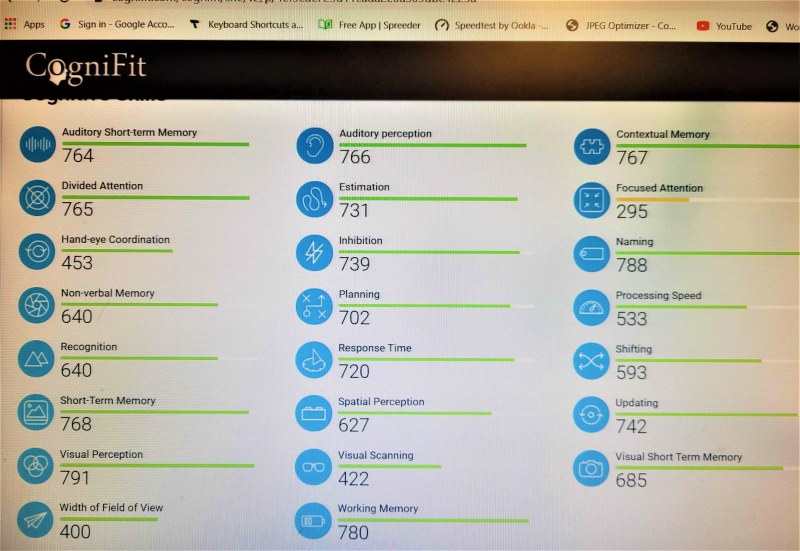
After 3 weeks of practice: Wednesday the 7th of April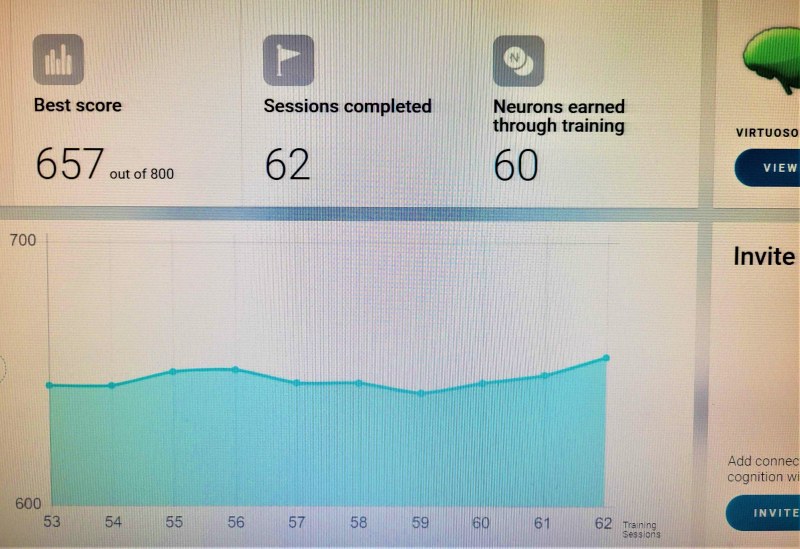
After 3 weeks of practice: Wednesday the 7th of April
If 800 is the equivalent of a 100% score, I started this experiment at 77.625% and ended with 82.125% after three weeks of training. That's a 5.797 percentage point improvement. Not to shabby considering that's almost a 2% gain per week.
Inevitably, at some point, I would have probably plateaued like a platypus running out of juice while swimming upstream in mating season. Another point to ponder is the potential gains could I have attained from gaming had I remained in training.
Also, if you want to have a more in-depth journey through my mind, here's my experience during my training sessions
Heat-of-the-Moment Feelings While Testing CogniFit & The Benefits I Got!
Here are some of my quotes about the experience during this experiment - I'll also venture into the benefits I got from training:
11:00pm March 18th:
"I'm having so much fun playing all these games. I spent 2 hours on CogniFit tonight. I love it that after training I can choose any game to play for as long as I want. The variety is addictive. My dopamine is sky-high.
The only rate-limiting factor is that it's my bedtime, otherwise I would be tempted to keep playing. I've noticed that playing these games lifts my spirits on top of the mood boost I get from work. I think these games are going to help hone my skills for work too. I have wanted to do a brain training program for the past 20 years or so. I feel so fortunate!"
10:42pm March 19th:
"I'm having way too much fun! Even on the games where I crash and burn like the traffic game, I'm laughing while trying my best to keep it together.
Reminds me of the times I did the visual fields testing myself so that I could explain to the patients that the computer was intentionally setting the peripheral vision threshold at the level where they would miss 50% of the lights and click that they just barely saw the other 50% to help people cope with the feeling like the test was far to difficult. It was equally challenging for people with perfect vision as it was for those who were almost entirely blind everyone was pushed to their limit and failed to see half the lights.
These tests feel like that because the game knows my limits and sets the difficulty to stretch my ability. I feel like a kid who's getting pummeled in dodge ball but having a blast trying my best."
10:52pm March 20th:
I played a couple of hours on my phone when I woke up and just finished a 100-minute training session on my PC after work. I'm still discovering new favorite games. CogniFit provides so many assessments daily. It had set a goal for me of 625, and I reached it tonight!
Get FREE Updates & EXCLUSIVE Content
Join Over 30,000+ Subscribers!











